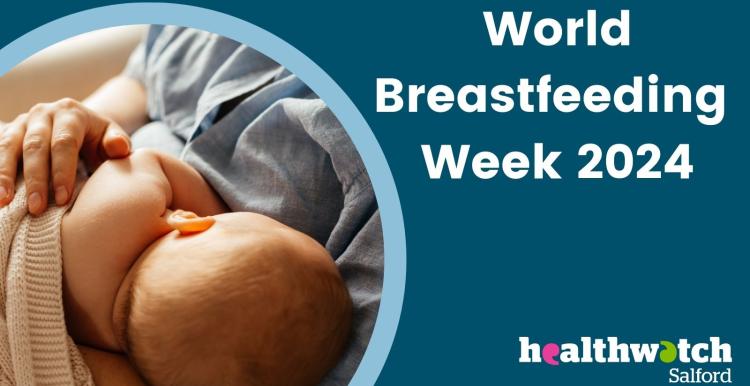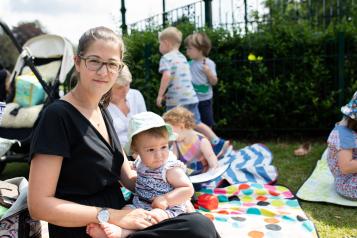Healthwatch Salford Spotlight: World Breastfeeding Week 2024

The event is organised every year by the World Alliance for Breastfeeding Action (WABA), a global network that aims to protect, promote and support breastfeeding around the world. Along the way, it works with the World Health Organization and Unicef to get its aid to the right people in the right communities.
World Breastfeeding Week begins each year on the 1st August and runs right through until the 7th.
Of course there are many different demands on busy mother’s, meaning that women who may want to breastfeed their babies haven’t always got the support to continue this. Busy working schedules, alongside the many other challenges that modern women face can mean that women don’t always feel that breastfeeding their child is something that is an accessible option to them.
Breastfeeding weeks aim to raise awareness of the health and wellbeing outcomes of breastfeeding and the importance of supporting mothers to breastfeed for as long as they wish.
#WBW2024 will focus on survival, health and wellbeing. It will showcase the need to improve breastfeeding support to reduce inequalities that exist in our society with a special focus on breastfeeding in times of emergencies and crises.
World Breastfeeding Week: Case Study
We spoke to a Salford resident about their experience of breastfeeding and support available.
Why did you choose to breastfeed?
I had my daughter in 2020 and it was the pandemic. I thought I’d try it because it was free and easy – my body makes milk and I can give that to my baby and pass on the antibodies. However as soon as I tried to latch her, I realised it wasn’t going to be quite as simple as that! In fact, I’d say it’s the harder choice because you’ve got to train yourself to do it.
What good examples are there of health and care services in Salford supporting breastfeeding women?
I had a great health visitor who came out during lockdown and really helped me. Thank goodness she was trained as a peer supporter as well as being a health visitor, so she could properly help me, and she spotted that my baby had a tongue-tie and referred me to Bolton.
I know about lots of other support groups – the Bolton Infant feeding team, B.O.O.B.S who cover Salford and Bury, Breastfeeding Together based in Wigan but the peer supporters come out to the wards in Bolton, Maternal Matters based in Prestwich, the local Bolton and NW Manchester NCT group, and the breastfeeding friendly sessions at Hug in a mug in Walkden. I ended up setting up a network called Bumps and Buggies which offers general support to other new mums, including signposting to local services for breastfeeding support.
Have you had any bad experiences from health and care services regarding breastfeeding?
Health services are in a position of trust and so they need to make sure that their knowledge is up to date. For example, we went to the dentist when my little girl was just under 2 and still breastfeeding, and the dentist gave me misinformation about how falling asleep on the breast can cause tooth decay. I had to pull them up about that and explain studies failed to prove a link between breastfeeding and cavities.
I would say that GP practices could be more welcoming to breastfeeding mums – eg by having posters up saying that breastfeeding is welcome, and offering the person feeding a glass of water. When my baby had her immunisation I wanted to breastfeed her to comfort her, and was told by the nurse that I couldn’t. When my baby was 18 months old I went to the GP with low iron and was told to give her a bottle then I could get a rest.
When my baby had a bad rash I was worried it might be meningitis. The health visitor told me that I could pass on a dairy allergy to my baby through my milk–cow milk protein allergy (CMPA). I took her to the PANDA unit and they told me to give her formula, but there is dairy in formula too, so that was bad advice!
And when Early Help saw us when she was 2 and I told them she wasn’t a great sleeper, I was yet again told that the solution was giving her a bottle!
Anything you would like to say to health and care services?
I can see from the families that I talk to that there is some misdiagnosis of tongue-tie, so the existing issues with positioning and attachment prevail post-op. When mums are struggling to overcome the challenges of breastfeeding, instead of directing them to local charities who can offer breastfeeding peer support, and even webchats to help with correct advice if they can’t travel, they are referring them for private tongue-tie assessments or saying to bottle feed. Not everyone can afford £100+ for an assessment, especially when what that mum and baby needs is for someone to just spend some time observing a feed, and to help and support their choice. The NHS service for frenulotomy assessment at Bolton Hospital has a long waiting list and this could be reviewed to ensure infant feeding is supported as soon as possible.
More information and advice:
B.O.O.B.S - Be Open on Breastfeeding Salford
https://www.breastfeedinginsalford.org.uk
Bumps and Buggies - Monton
https://www.facebook.com/groups/bumpsandbuggiesmonton
NCT Bolton and North West Manchester
https://www.nct.org.uk/local-activities-meet-ups/bolton-and-north-west-manchester


